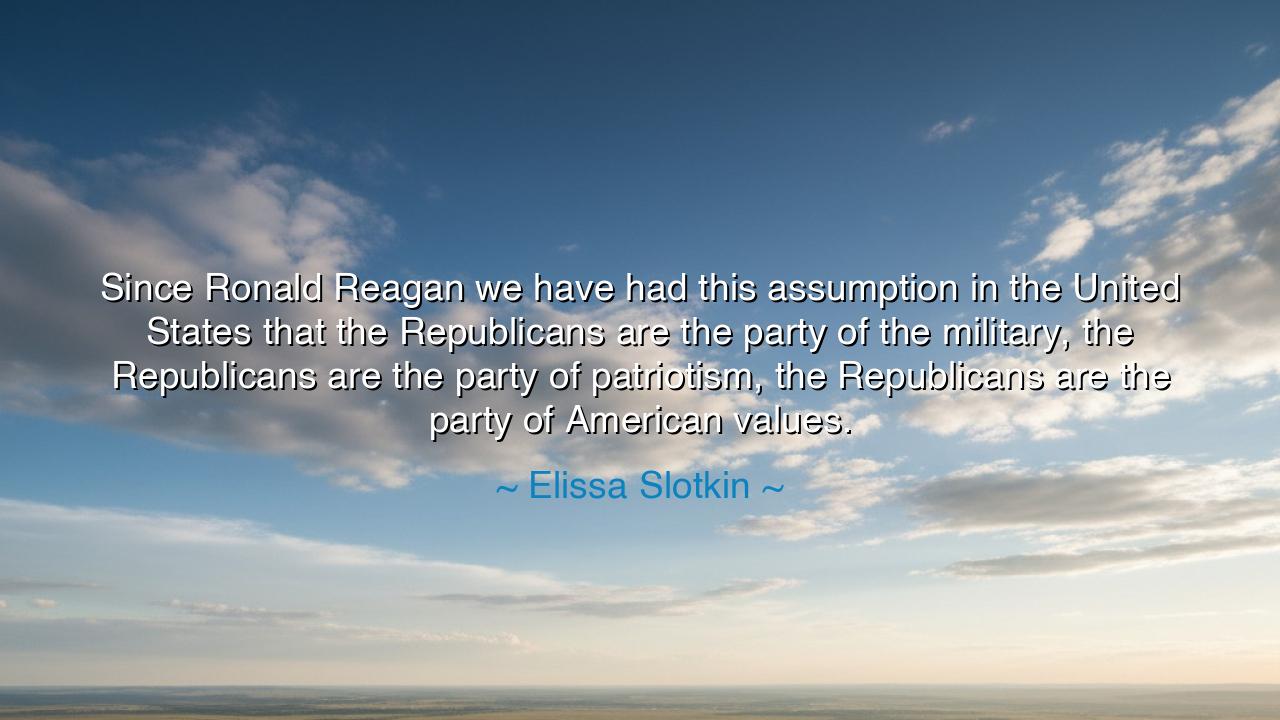
Since Ronald Reagan we have had this assumption in the United
Since Ronald Reagan we have had this assumption in the United States that the Republicans are the party of the military, the Republicans are the party of patriotism, the Republicans are the party of American values.






The words of Elissa Slotkin—“Since Ronald Reagan we have had this assumption in the United States that the Republicans are the party of the military, the Republicans are the party of patriotism, the Republicans are the party of American values.”—speak with the weight of history, unveiling how ideas can take root in the minds of nations and shape their politics for generations. She names an assumption, not an eternal truth, but a perception forged by rhetoric, symbolism, and the power of leadership. In her voice we hear a reminder that patriotism, military service, and values do not belong to one party, one group, or one ideology—they belong to the people, to the whole of the nation.
To understand these words, one must return to the figure of Ronald Reagan, who rose in the 1980s as a symbol of American strength and confidence. His speeches were filled with appeals to the greatness of the United States, to the honor of its soldiers, and to the shining promise of freedom. Through his leadership, the Republican Party came to embody, in the eyes of many, the mantle of military pride and patriotic fervor. The Cold War gave this image fertile ground, for Reagan cast America as a beacon of liberty against the “evil empire” of Soviet communism. Thus was born the long-standing assumption that Slotkin describes.
Yet history shows that patriotism and the defense of American values are far older and broader than any single party. The Democratic President Franklin D. Roosevelt led the nation through the Second World War, calling forth the courage of millions to defeat fascism. The Democratic President Harry Truman made the fateful choice to resist Soviet expansion, laying the foundation of the Cold War struggle. And generations of Americans from every political persuasion have fought, sacrificed, and bled for their country. Slotkin’s words remind us that while parties may claim the mantle, the truth is that loyalty, service, and values belong to the entire people.
There are moments in history when this becomes clear. Recall the tragedy of September 11, 2001. On that day, Americans of every background, every belief, every political party united in grief and in resolve. Firefighters and police officers ran into burning towers; ordinary citizens rushed to help strangers; soldiers prepared for battle abroad. In those days of fire and sorrow, there was no single party of patriotism, no monopoly on American values. The nation discovered again that love of country is not the property of politicians, but the shared inheritance of its people.
The deeper meaning in Slotkin’s observation is this: nations must beware of allowing symbols of unity to be claimed as weapons of division. When one party or group proclaims itself the sole guardian of patriotism, it casts others as traitors. When one faction claims exclusive loyalty to the military, it dishonors the countless veterans who have served under leaders of every party. When one ideology wraps itself in the flag, it risks making the flag a partisan banner rather than a national one. Such claims weaken the fabric of unity and turn love of country into a tool of rivalry.
The lesson for us is clear: reject the assumption that patriotism is the property of any single party or creed. Instead, reclaim it as the birthright of every citizen. Honor those who serve, not for their politics but for their sacrifice. Defend American values, not as slogans, but as living truths—freedom, equality, justice, and compassion—that transcend party lines. Recognize that the nation is strongest when its symbols are shared by all, not hoarded by a few.
In practice, this means listening with humility to those across the aisle, acknowledging their love of country even when their vision differs from ours. It means teaching our children that the flag does not belong to Republicans or Democrats, but to all Americans. It means remembering that American values are not perfected by one party’s rule, but by the constant striving of all citizens together.
Thus let Slotkin’s words echo in us as a reminder and a warning: the assumption of party ownership over patriotism is powerful, but it is not truth. The truth is deeper, nobler, and more enduring—that patriotism belongs to the people. It is the shared fire of loyalty that binds the nation through war and peace, through division and reconciliation. Let us guard it well, and never surrender it to the narrow claims of faction.






AAdministratorAdministrator
Welcome, honored guests. Please leave a comment, we will respond soon